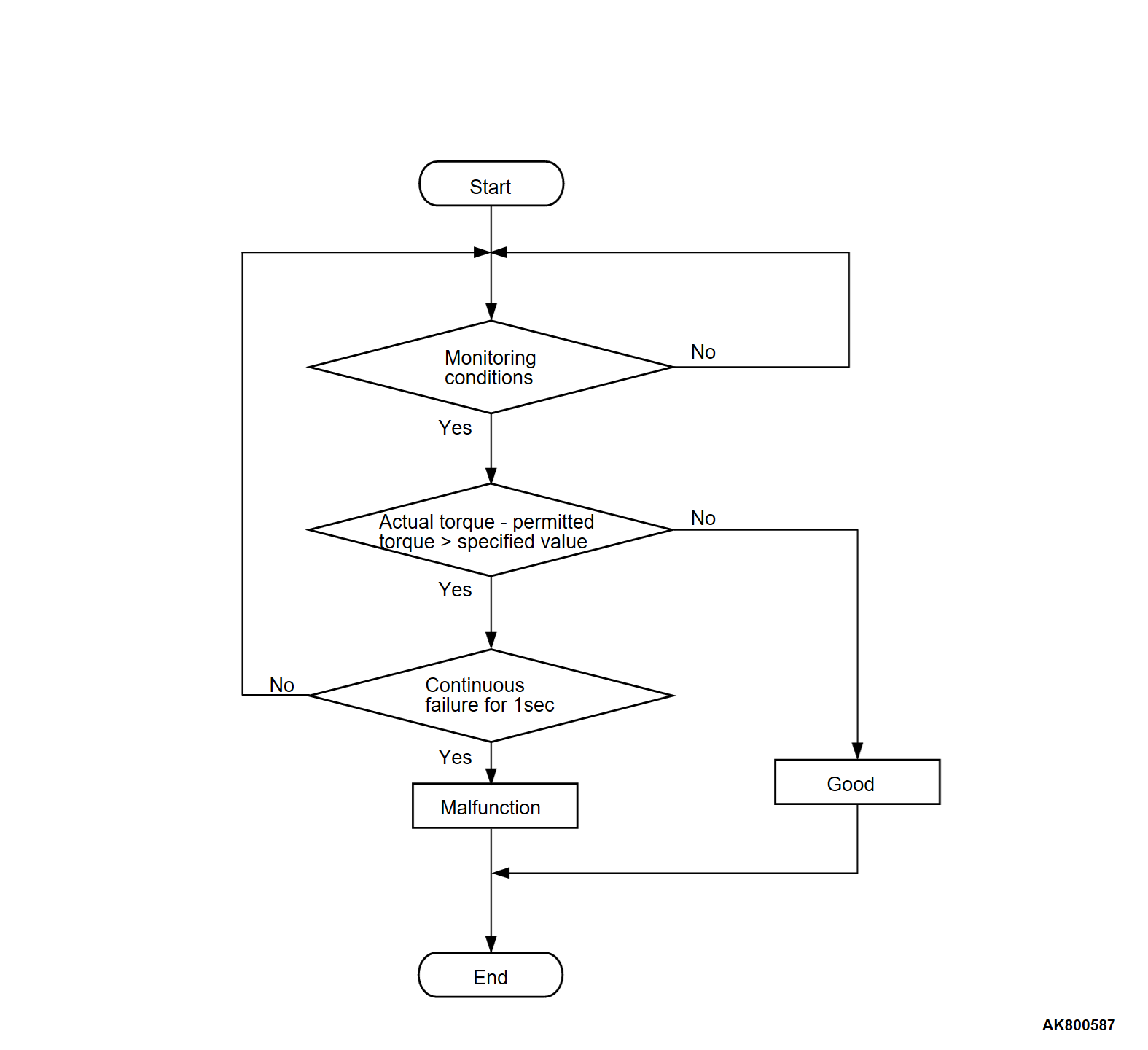DTC P061A: Internal Control Module Torque Performance Problem
TECHNICAL DESCRIPTION
Compares the actual torque signal computed from a mass airflow sensor signal with the driver demand torque signal computed from an accelerator pedal position sensor signal.
MONITOR EXECUTION
- Continuous
MONITOR EXECUTION CONDITIONS (Other monitor and Sensor)
Other Monitor (There is no temporary DTC set in memory for the item monitored below)
- Not applicable
Sensor (The sensor below is determined to be normal)
- Not applicable
DTC SET CONDITIONS
Check Conditions
- Engine speed is 500 r/min or higher.
- Volumetric efficiency is 16 percent or higher.
Judgment Criterion
- The requested torque signal subtracted from the actual torque signal is more than 70 N·m (52 ft-lb) for 1 second.
FAIL-SAFE AND BACKUP FUNCTION
- Throttle opening degree position is in default position.
TROUBLESHOOTING HINTS (The most likely causes for this code to be set are:)
- Throttle actuator control motor failed.
- Throttle actuator control motor circuit, harness damage or connector damage.
- Vacuum leak.
- ECM failed.
DIAGNOSIS
STEP 1. Using scan tool (M.U.T.-IIISE), read the diagnostic trouble code (DTC).
| caution | To prevent damage to scan tool (M.U.T.-IIISE), always turn the ignition switch to the "LOCK" (OFF) position before connecting or disconnecting scan tool (M.U.T.-IIISE). |
(2) Turn the ignition switch to the "ON" position.
(3) Read the DTC.
(4) Turn the ignition switch to the "LOCK" (OFF) position.
Is the diagnostic trouble code other than P061A set?
STEP 2. Using scan tool (M.U.T.-IIISE), check data list item 10: Mass Airflow Sensor.
(1) Start the engine and run at idle.
(2) Set scan tool (M.U.T.-IIISE) to the data reading mode for item 10, Mass Airflow Sensor.
(3) Warm up the engine to normal operating temperature: 80°C to 95°C (176°F to 203°F).
- The standard value during idling should be between 800 and 1,120 millivolts.
- When the engine is revved, the output voltage should increase according to the increase in engine speed.
(4) Turn the ignition switch to the "LOCK" (OFF) position.
Is the sensor operating properly?
STEP 3. Using scan tool (M.U.T.-IIISE), check data list item 11: Accelerator Pedal Position Sensor (main).
(1) Turn the ignition switch to the "ON" position.
(2) Set scan tool (M.U.T.-IIISE) to the data reading mode for item 11, Accelerator Pedal Position Sensor (main).
- Output voltage should be between 900 and 1,100 millivolts when foot is released from accelerator pedal.
- Output voltage should be 4,000 millivolts or more when accelerator pedal is fully depressed.
(3) Turn the ignition switch to the "LOCK" (OFF) position.
Is the sensor operating properly?
STEP 4. Using scan tool (M.U.T.-IIISE), check data list item 12: Accelerator Pedal Position Sensor (sub).
(1) Turn the ignition switch to the "ON" position.
(2) Set scan tool (M.U.T.-IIISE) to the data reading mode for item 12, Accelerator Pedal Position Sensor (sub).
- Output voltage should be between 400 and 600 millivolts when foot is released from accelerator pedal.
- Output voltage should be 2,000 millivolts or more when accelerator pedal is fully depressed.
(3) Turn the ignition switch to the "LOCK" (OFF) position.
Is the sensor operating properly?
STEP 5. Check for intake system vacuum leak.
STEP 6. Check for foreign matter being around the mass airflow sensor.
STEP 7. Check the throttle actuator control motor resistance.
Refer to Throttle Actuator Control Motor Check  .
.
 .
.Is the measured resistance between 0.3 and 100 ohms [at 20°C (68°F)]?
STEP 8. Check of harness damage in ETV+ line between throttle body assembly connector and ECM connector.
STEP 9. Check of harness damage in ETV- line between throttle body assembly connector and ECM connector.
STEP 10. Check the intake charge pressure.
Refer to GROUP 15, On-vehicle Service - Intake Charge Pressure Check  .
.
 .
.Is the intake charge pressure normal?
![[Previous]](../../../buttons/fprev.png)
![[Next]](../../../buttons/fnext.png)


